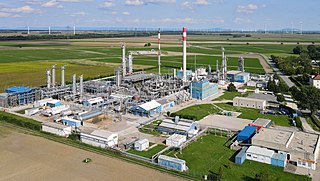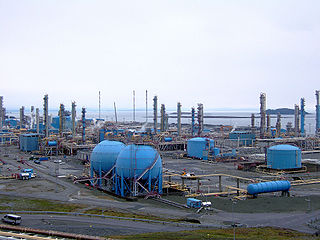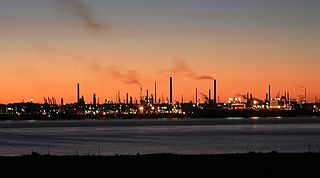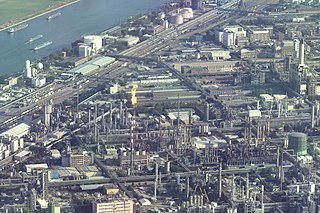
A refinery is a production facility composed of a group of chemical engineering unit processes and unit operations refining certain materials or converting raw material into products of value.
Natural-gas condensate, also called natural gas liquids, is a low-density mixture of hydrocarbon liquids that are present as gaseous components in the raw natural gas produced from many natural gas fields. Some gas species within the raw natural gas will condense to a liquid state if the temperature is reduced to below the hydrocarbon dew point temperature at a set pressure.

Catalytic reforming is a chemical process used to convert petroleum refinery naphthas distilled from crude oil into high-octane liquid products called reformates, which are premium blending stocks for high-octane gasoline. The process converts low-octane linear hydrocarbons (paraffins) into branched alkanes (isoparaffins) and cyclic naphthenes, which are then partially dehydrogenated to produce high-octane aromatic hydrocarbons. The dehydrogenation also produces significant amounts of byproduct hydrogen gas, which is fed into other refinery processes such as hydrocracking. A side reaction is hydrogenolysis, which produces light hydrocarbons of lower value, such as methane, ethane, propane and butanes.

Singapore Petroleum Company Limited, in short SPC, is a Singaporean multinational oil and gas company. It is involved in the exploration and production of petroleum, refining, trading and petroleum product distribution.

Petroleum production in Canada is a major industry which is important to the overall economy of North America. Canada has the third largest oil reserves in the world and is the world's fourth largest oil producer and fourth largest oil exporter. In 2019 it produced an average of 750,000 cubic metres per day (4.7 Mbbl/d) of crude oil and equivalent. Of that amount, 64% was upgraded from unconventional oil sands, and the remainder light crude oil, heavy crude oil and natural-gas condensate. Most of the Canadian petroleum production is exported, approximately 600,000 cubic metres per day (3.8 Mbbl/d) in 2019, with 98% of the exports going to the United States. Canada is by far the largest single source of oil imports to the United States, providing 43% of US crude oil imports in 2015.
Gassco is a Norwegian state owned company that operates 7,800 kilometres (4,800 mi) of natural gas pipes transporting annually of 100 billion cubic meter (bcm) of natural gas from the Norwegian continental shelf to Continental Europe and Great Britain.

Natural-gas processing is a range of industrial processes designed to purify raw natural gas by removing contaminants such as solids, water, carbon dioxide (CO2), hydrogen sulfide (H2S), mercury and higher molecular mass hydrocarbons (condensate) to produce pipeline quality dry natural gas for pipeline distribution and final use. Some of the substances which contaminate natural gas have economic value and are further processed or sold. Hydrocarbons that are liquid at ambient conditions: temperature and pressure (i.e., pentane and heavier) are called natural-gas condensate (sometimes also called natural gasoline or simply condensate).

Kårstø is an industrial facility located near the village of Susort, along the Boknafjorden, in the municipality of Tysvær in Rogaland county, Norway. The site features a number of natural gas processing plants that refine natural gas and condensate from the fields in the northern parts of the North Sea, including the Åsgard, Mikkel, and Sleipner gas fields. The Kårstø processing complex is Europe's biggest export port for natural gas liquids (NGL) and the third largest in the world. The industrial site is also the location for the now-closed Kårstø Power Station.

Sirte Oil Company (SOC) is an oil and gas company in Libya operating under the state-owned National Oil Corporation (NOC). The company is located in Brega SOC’s operations include oil and gas exploration and production (E&P) and manufacturing.

Fawley Refinery is an oil refinery located at Fawley, Hampshire, England. The refinery is owned by Esso Petroleum Company Limited, a subsidiary of Exxon Mobil Corporation, which acquired the site in 1925. Situated on Southampton Water, it was rebuilt and extended in 1951 and is now the largest oil refinery in the United Kingdom, and one of the most complex refineries in Europe. With a capacity of 270,000 barrels (43,000 m3) per day, Fawley provides 20 per cent of the UK's refinery capacity. Over 2,500 people are employed at the site.

The Central Area Transmission System is a natural gas transportation and processing system that transports natural gas through a 404 kilometre pipeline from the Central North Sea to a reception and processing terminal at Teesside in the North East of England.

Gdańsk oil refinery is a 10.5 million tonne per year refinery located near the Polish city of Gdańsk on the Baltic Sea. The refinery was established in 1975 to supply fuels and lubricants, and has undergone several upgrades and expansions to increase its capacity and the range of products available. It now has a Nelson complexity index of 11.1. It is one of two oil refineries in Poland, the other is Plock refinery.

The BPRefinery (Kent) was an oil refinery on the Isle of Grain in Kent. It was commissioned in 1953 and had a maximum processing capacity of 11 million tonnes of crude oil per year. It was decommissioned in August 1982.

Petroleum refining processes are the chemical engineering processes and other facilities used in petroleum refineries to transform crude oil into useful products such as liquefied petroleum gas (LPG), gasoline or petrol, kerosene, jet fuel, diesel oil and fuel oils.
Inter Pipeline Ltd. is a multinational petroleum transportation and infrastructure limited partnership that is ranked among North America's leading natural gas and NGL's extraction businesses. It is one of Alberta's top 100 companies in terms of profit (85) and assets (94).

The Bahrain Petroleum Company (BAPCO) is an integrated petroleum company that is the national oil company of Bahrain.
The oil industry in Poland began at Bóbrka Field in 1853, followed by the first refinery in 1854. Poland was the third most productive region in the world in 1900. It now has only a small, mostly state-owned component, with production from its Permian Basin in the west, small and very old fields in the Carpathians in the south, and offshore in the Baltic Sea. For natural gas the country is almost completely dependent on legacy pipelines from the former Soviet Union.

Steam cracking is a petrochemical process in which saturated hydrocarbons are broken down into smaller, often unsaturated, hydrocarbons. It is the principal industrial method for producing the lighter alkenes, including ethene and propene. Steam cracker units are facilities in which a feedstock such as naphtha, liquefied petroleum gas (LPG), ethane, propane or butane is thermally cracked through the use of steam in steam cracking furnaces to produce lighter hydrocarbons. The propane dehydrogenation process may be accomplished through different commercial technologies. The main differences between each of them concerns the catalyst employed, design of the reactor and strategies to achieve higher conversion rates.
The Teesside oil terminal is a major crude oil reception, processing, storage and export facility at Seal Sands, Middlesbrough. It receives and processes crude oil delivered by the subsea NORPIPE pipeline from the Norwegian Ekofisk field and the UK Fulmar and J-Block fields. The terminal includes facilities for exporting stabilised crude oil and liquefied petroleum gases (LPG) by tanker and pipeline.
The Whitegate refinery, near Whitegate, County Cork, is Ireland's only oil refinery. It has a capacity of 75,000 barrels of oil per day (bpd), sufficient to provide 40 percent of Ireland's fuel requirements. It was commissioned in 1959 and was redeveloped several times and produces a range of petroleum products.













